published: 16 /
11 /
2021
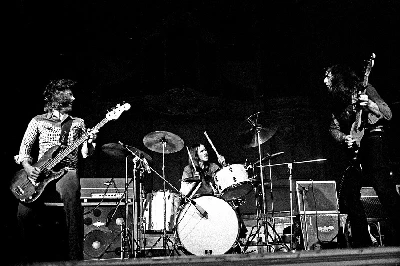
Bassist Gerry McAvoy talks about Rory Gallagher’s legacy, touring during their heyday, the 5Oth anniversary of Gallagher’s eponymous debut album and keeping his memory alive.
Article
Our interview with Gerry McAvoy begins wistfully, not least because it coincides with the death of Charlie Watts. "I thought he'd live forever," McAvoy says, his voice adding to the many tributes being paid towards The Rolling Stones sharply dressed drummer.
It has particular resonance for this conversation; McAvoy is speaking about Rory Gallagher, the strikingly dynamic guitarist who won praises all over the island from which both McAvoy and I hail. Gallagher sadly died in 1995, years before Cork city would commemorate their homespun hero with a plaque in his name. "There was a friend of ours, Bibi, who was petitioning to have the Cork airport named after Rory," McAvoy says, laughing.
McAvoy was a loyal lieutenant and longtime bassist for The Rory Gallagher Band. According to him, Gallagher regarded himself as a national, as opposed to a regional icon. "I think he just considered himself Irish. I mean, he was born in Ballyshannon, then moved to Derry. But Cork is where he spent most of his life."
McAvoy is in a chirpy mood. He lives in France, close to Mick Jagger. McAvoy suspects The Stones will continue for the foreseeable future. Like most musicians growing up on either side of the Irish Sea, McAvoy was captivated by the band. However, he doesn't consider Bill Wyman a formative influence on his bass playing.
"I started off with a guy from The Shadows in the sixties called Jet Harris. And I liked him because he looked great. You know, when you're a kid, it's, 'I want to play bass guitar like he plays it.' He had a red Fender bass guitar and a silver suit: he just looked amazing! But then, when I started to grow up a bit, I started listening to Paul McCartney. Paul is probably one of the most melodic bass players. Especially 'Something', the George Harrison song, it's like a melody on its own."
The first time McAvoy met Gallagher was when Taste MKI came to Belfast. "They stayed in a town just outside Belfast called Ballycloghan, I think, and they started playing in the clubs around Belfast. There was a great blues scene at the time, a rhythm & blues scene. Rory had heard about this from the bands that were going down from the North, playing Cork and Dublin. There was a band called Just Five that I knew, and Rory had just met up with them inCork because one of the guitar players couldn't make it. They knocked on Rory's door and said: 'Do you fancy coming up with us and standing in for one of the guitar players?' Rory made friends with the guitar player, a guy called Billy McCoy. Billy says: 'If you're in Belfast, give us a knock.' He ended up staying for ten days, living on McCoy's mothers' floor."
With his wild locks and bubbly personality, Gallagher had become something of a local celebrity. "First of all, he looked great. People would recognise him on the street."
There was a music store in Belfast called Crymbles, where all us young musos used to go for guitars. McAvoy entered the fateful store just in time to meet Gallagher posing himself behind a guitar he was eager to test out. "I plucked up the courage to say hello to him," McAvoy says, chuckling. "He was so gentle, and we chatted for about five minutes. I asked him for some advice about trying to get into a band: 'Just keep practising, and listen to as many people as you can.' He told me to 'play with as many people as you can'. It was good advice!"
Like McCartney before him, McAvoy started on the six-string before discovering his calling as a bassist; Belfast locals Pride were short a bassist, so McAvoy stepped into the slot. Blues savants Jack Bruce and Willie Dixon were next on the list of influences, but Motown favourite James Jamerson also made his way into McAvoy's music. He carefully considers which of his bass patterns are among his favourites. "That's a hard one," he cackles. "So many of them. 'Calling Card' is one because the intro is on bass. There's a song called 'Lost At Sea', which has a really unusual bassline. 'Laundromat' was a great line that's just following Rory's riff."
However committed he was to his instrument, he fundamentally knew his place in the band. He maintains that bass is primarily there to lock in with the drummer. "I grew up with Brendan O'Neill; we went to the same school in Belfast. When Ted McKenna left around '81, we were looking for a drummer. Rory got Wilgar Campbell back in again to try him out. Wilgar was the first drummer with The Rory Gallagher Band. We were trying out a couple of different drummers, and it wasn't going anywhere, so I just mentioned Brendan, who was living in London at the time. Rory said to get him along; he got the gig!"
He performed his first gig with Gallagher in Paris before returning to the UK. "Up and down the country," he says. "Newcastle, and then up to Scotland. We were playing mostly in small venues at that stage. Bit by bit, it would go up a ladder a bit."
While climbing the ladder, the band hardened their sound. Whenever he appeared with a new song, Gallagher would refrain from giving directions ("He never had a sheet") but felt his way into the arrangement. Like many Irish men of his generation, Gallagher had an honest work ethic that seeped into his art. Whatever else could be said about the band, there was no pretence.
"The thing about Rory is that even when we did a slow blues like 'I Wonder Who', he would never lay back on it," McAvoy attests. "Rory would always say, 'Muddy Waters – whenever he sang something like 'I'm A Man', it was never laid back.' It was up there!"
However, Gallagher had a softer side, especially on the first album, which McAvoy is quick to bring up. Now celebrating 50 years, Gallagher's self-titled debut demonstrated the singer's more pastoral qualities. The album boasts a hefty dose of mandolin (it was, after all, the era of Martin Quittenton and Fairport Convention.) "When Rory went to have his own band to do that first solo album, so to speak, he was trying to capture all his influences. Jazz, folk, blues, a little bit of pop. He took it in a different direction, and in later years, it got a bit more steamy, from Deuce onwards."
These days, McAvoy fronts Band Of Friends, a live unit that performs much of Gallagher's music in his honour. 'Calling Card' is a particular favourite. With its towering guitar line and turbocharged chorus, the song represents the acme of Gallagher's songwriting ability. It's amazing to think that Gallagher accomplished all that without the help of a second guitar player.
"We actually tried out a second guitar player, which must have been the time of the four-piece," McAvoy admits. "When that folded up (and it had Ted McKenna on drums), Rory fancied getting another guitar player because he just loved rhythm guitar players. Real rhythm guitar players. We could think of one guy who played with Ted Nugent and Michael Schenker. So, we got a couple of guys in, but it didn't really work out. So, we ended up with a harmonica player."
McAvoy recalls touring with The Faces ("A nice little package," the bassist says). They knew Jimmy Page socially. But for all the glory, McAvoy seems most impressed with his leader's decision to perform around Ulster at a particularly dicey time in history. "The first time we went to Belfast was '71, and The Troubles were fairly hot at the time. Rory said, 'No, I want to play in Belfast'. You have to give him his dues for doing it-we did it every year!"
We touch upon The Miami Showband killings. The band were victims of a conflict waging around the halls they just so happened to play. At a time of great upheaval, many bands were reluctant to travel across the border. Still, Gallagher remained steadfast in his resolve. "It was taking a risk," McAvoy says. "But to see the crowd on those nights, because nobody was playing there...People were starved of music. Rory and the band were the only ones going there at that time."
For people tired of segregation, rock music united them under one voice. It didn't matter whether it was a Union Jack or a Tricolour flag that took your fancy; Gallagher's music spoke to everyone. From the more progressive sect of rock (Brian May, Slash) to the choppier, mouthier bands that centred eighties indie radio (Johnny Marr and The Edge), many guitarists have all acknowledged his influence.
McAvoy admits he was surprised to hear that Andy Partridge admired their work. The guitar player was nicknamed "Roaring Gallagher" in certain parts of rural Ireland, but there was never anything particularly untoward about his music or his persona. Instead, it was blues presented in raw, rollicking strokes, and the band (usually a trio) took great pains to re-create the live experience within the confines of the studio.
"The Rory Gallagher Band was a live band. The way we recorded was live because Rory wanted that raw feeling. [He wanted that] on the edge feeling, as opposed to doing it bit by bit. Some bands lay the drums down, then lay the bass down...Rory wanted to do it the same way his idols did: Muddy Waters, Jerry Lee Lewis. One microphone in the room when they did it, not so much when we did it. He still wanted to create that live thing, even on a record. Re-create as best he could. Playing a song like 'Laundromat', Rory would do the solo live; it wasn't overdubbed. If anything was overdubbed, it was a little bit of rhythm guitar."
Although they followed in the footsteps of power trio progenitors Cream, Gallagher was wary of extending sets into a series of frenzied instrumental passages. In some ways, his playing style owed more to the punk outfits that were soon to follow. Like Gallagher, Irish bands The Undertones and Stiff Little Fingers managed to further the name of confessional rock through pounding licks, polished lyrics, and impassioned vocal performances.
"Rory was unique in such a way," McAvoy says. "Rory played the blues, but he studied his craft. He was in the showbands: stagecraft came from the showbands. But I think there was a certain Irishness in Rory's playing. Even when he was playing the blues licks, he would throw something Irish in there, which made it so unique. A lot of fellow guitar players at the time went, 'Oh, that's strange.' I think that was part of Rory's brilliance."
Gallagher was hardly garrulous ("As far as having a long conversation with the audience, no: Rory didn't do that," McAvoy says), but he spoke to his fanbase with his energy and tremendous displays of guitar invention.
"The first album, because it was the first album I worked on, is very close to my heart. The second album, Deuce, I thought was fantastic. It was so rough and ready. Some nights, we would do a gig in Leicester or Luton, and we would go straight into the studio because we still had some adrenaline from the gig so that we would work until six or seven o'clock in the morning."
McAvoy remembers all their work with fondness, although he grows visibly sadder when he remembers their last tour in 1991. "The last show was in New York," he sighs. He remembers his friend as a genius who never suffered from "false ego."
As custodian of the band work, McAvoy is promoting the 50th-anniversary edition of Rory Gallagher. He's also bringing Gallagher's music back on the road.
"After Rory, I played in a band called Nine Below Zero," McAvoy attests. "It must have been mid-2006, 2007...I moved to France, and I got my old stereo out of storage and started playing all my old vinyl that I hadn't played for years. I started playing all of Rory's stuff and started to realise, 'These songs are great.' It would be great to get a band together and take them out on the road. It took quite a few years to develop that, and probably around 2011 or 2012, I left Nine Below Zero and got Band of Friends together. The first person I approached was Ted McKenna, the drummer with Rory from '78 to '81. Ted wasn't doing much at the time; he was lecturing at Glasgow University. Ted said, 'Yeah: up for it.' And I found this other guy [Marcel Scherpenzeel] who played in a Rory tribute band in Amsterdam. And he came along.
“We started in 2011, 2012, and it grew and grew and grew. Sadly, we lost Ted in 2019, so Brendan O'Neill came on board. After Ted died, I wasn't too sure if we would keep on going. Marcel wanted to do his own thing, so he formed his band. So, I got two new guys in: Paul Rose from Newcastle and Jim Kirkpatrick. It's a completely new lineup, and we just introduced the lineup last week. We did two festivals in the UK."
That it takes two guitarists to replicate Gallagher's work is testament to the man's skill, but who will do the singing? "Jim Kirkpatrick does most of the singing," McAvoy replies. "I take on a couple of songs: I try my best at vocalising[cackles]. The next show is the Northern Kin Festival, I think, in County Durham, and then there's Zan Daam in The Netherlands. Then, we start our German tour, which lasts for about a month. We are going to Barcelona for the festival in the middle of October. Then, some shows in England: The Cavern, Liverpool. And then, Ireland in November. Belfast, Dublin and Drogheda. Hopefully, Cork's going to come on board as well!"
Band Links:-
https://rorygallagher.com/
https://www.facebook.com/RoryGallagher
https://twitter.com/rorygallagher
Play in YouTube:-
Have a Listen:-
Picture Gallery:-
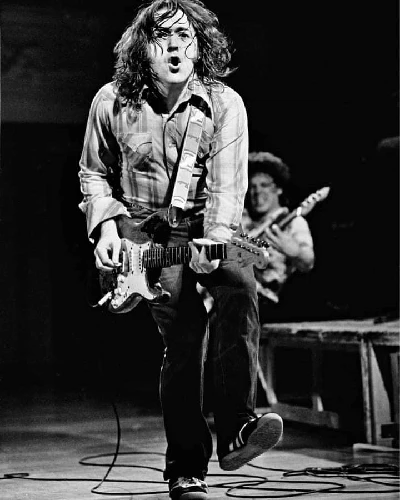
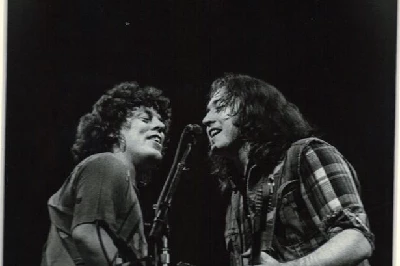
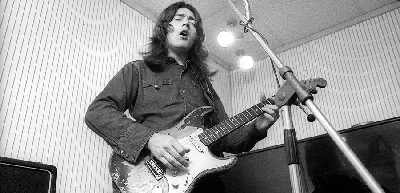
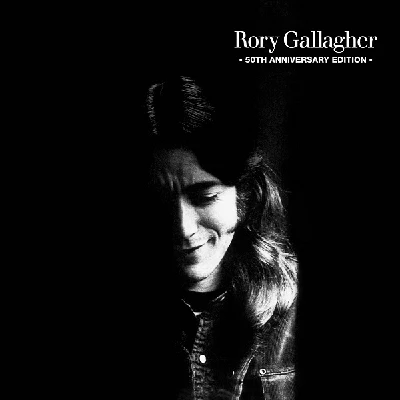
Visitor Comments:-
|
|
4462 Posted By: Roger Diamond, East Kent. on 21 Jun 2023 |
Bloody marvellous - so good. I must buy the album.
|